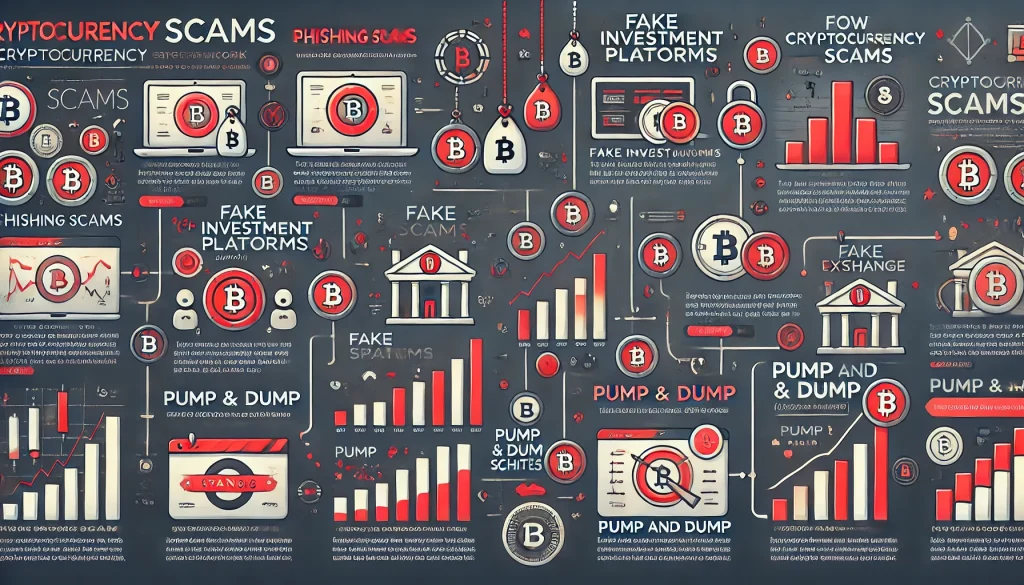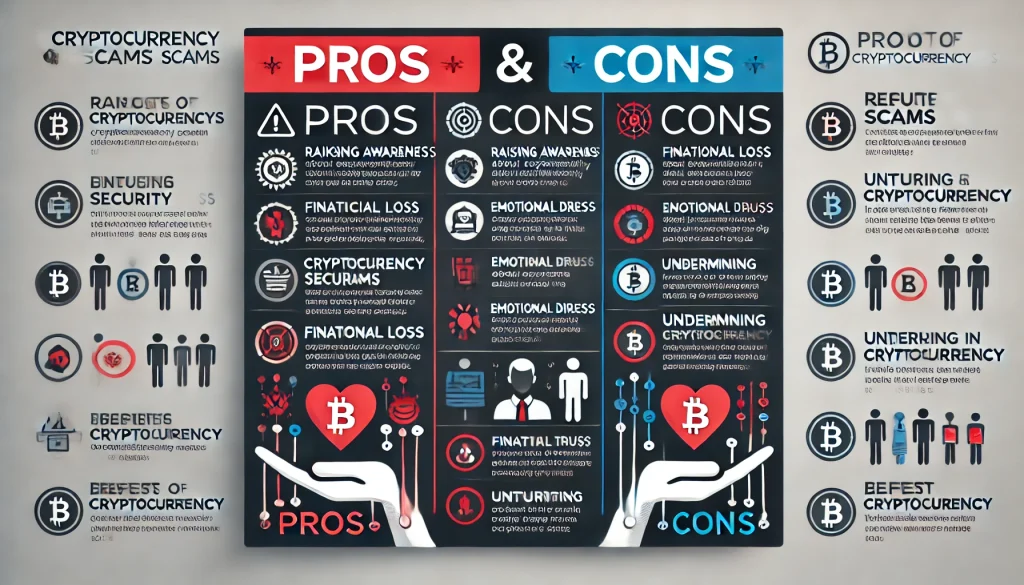
Cryptocurrency Scams have emerged as a revolutionary digital asset, attracting investors and technologists alike. However, as their popularity has grown, new types of fraud have also emerged. Understanding cryptocurrency fraud is important to avoid significant financial risks. This article explores the definition, origins, and types of cryptocurrency fraud. It also suggests ways to avoid becoming a victim of fraud.
What is Cryptocurrency Scams?
Cryptocurrency fraud is a fraudulent activity in which an individual or group deceives others with false promises to invest or transfer digital assets, ultimately resulting in financial loss. These scams take advantage of the unique characteristics of cryptocurrencies, such as anonymity, decentralization, and the complexity of blockchain technology, to create an environment that makes it particularly difficult to track and recover stolen assets. Synonyms for cryptocurrency fraud include cryptocurrency fraud, digital currency fraud, and blockchain fraud. These scams can take many forms, from sophisticated Ponzi schemes to subtle phishing attacks, all of which aim to capitalize on a victim’s lack of knowledge or awareness.
They can involve fake exchanges, deceptive investment platforms, or even fraudulent initial coin offerings (ICOs). What makes these scams particularly dangerous is that once a transaction is confirmed on the blockchain, it is irreversible and leaves the victim with little recourse.
Background on Cryptocurrency Scams
This has evolved alongside the evolution of digital currencies, and fraudsters are constantly adapting their tactics to capitalize on the latest trends and technologies. The decentralized nature of cryptocurrencies and the lack of regulatory oversight make them an attractive target for fraudsters. To understand the background of cryptocurrency fraud, it’s important to examine the history of digital currencies and the various ways they are manipulated for illicit gain.
Origin/History
The history of cryptocurrency fraud dates back to the early days of Bitcoin. As the value of Bitcoin began to rise, the number of schemes to separate investors from their money increased. One of the earliest known scams was the “Bitcoin Ponzi scheme,” in which scammers promised high returns on Bitcoin investments but eventually disappeared along with investors’ funds.
The rise of ICOs presented a new avenue for fraudsters. In these scams, fraudsters created fake projects and sold tokens to investors, often with no intention of developing the promised product. Many of these ICOs were nothing more than elaborate scams, and the perpetrators disappeared as soon as they raised enough money.
| Year | Scam types | Description |
|---|---|---|
| 2013 | Bitcoin Ponzi schemes | They promised a high return on investment but disappeared with the funds. |
| 2017 | ICO Scams | A fraudulent ICO where a fake company sold tokens without a real project. |
| 2020 | Phishing attacks | Targeted individuals by impersonating legitimate exchanges and wallets. |
Types of Cryptocurrency Scams
It comes in many forms, each designed to capitalize on a specific aspect of digital currency transactions. Below are some of the most common types of cryptocurrency fraud:
| Scam types | Description |
|---|---|
| Phishing scams | Scammers create fake websites or emails to steal personal information or private keys. |
| Ponzi schemes | Investors are promised high returns with little risk, but payments are made using new investors’ funds. |
| Fake exchanges | Scammers create fake cryptocurrency exchanges to steal users’ deposits. |
| Pump and dump method | Scammers artificially inflate the price of cryptocurrencies and sell them at a high price, leaving others with losses. |
| ICO Scams | Fraudulent initial coin offerings where the project behind the token does not exist. |
How does Cryptocurrency Scams work?

Cryptocurrency fraud operates by capitalizing on the technical complexity and often misunderstood nature of digital currencies. Scammers use a variety of strategies to trick victims, making it difficult for even experienced investors to distinguish between legitimate and fraudulent opportunities. Here’s how these scams typically work:
- Phishing scams: Scammers create fake websites that mimic legitimate cryptocurrency exchanges or wallets.
- Fake investment platforms: Scammers set up fake investment platforms that promise high returns with little risk.
- Pump and dump schemes: In these schemes, a group of fraudsters work together to buy large amounts of low-value cryptocurrency, artificially driving up the price.
Pros and cons of cryptocurrency scams

It may seem odd to discuss the pros and cons of cryptocurrency scams, but understanding both sides is essential to better protect yourself.
| Prose | Cones |
|---|---|
| Raise awareness of the importance of cybersecurity. | Causes significant financial loss and emotional distress. |
| Encourage them to develop better security measures. | Undermine trust in the cryptocurrency market. |
| Highlight the need for regulation in the crypto space. | Makes it harder for legitimate projects to gain traction. |
Companies with Cryptocurrency Scams
Some companies and platforms are notorious for their involvement in cryptocurrency scams, either directly or by being impersonated by scammers. Here are a few examples
Bitconnect
Bitconnect was one of the most notorious cryptocurrency scams in history. Marketed as a high-yield investment program, Bitconnect promised astronomical returns to investors through proprietary trading bots and a lending platform.
However, in 2018, it was revealed that Bitconnect was nothing more than a Ponzi scheme. The platform collapsed, investors suffered significant financial losses, and the promoters faced legal action.
OneCoin
OneCoin is another infamous example of a cryptocurrency scam. Launched in 2014, OneCoin was marketed as a revolutionary new cryptocurrency that would rival Bitcoin. However, it was later revealed that there was no blockchain or real technology behind OneCoin.
The founders of OneCoin made billions of dollars from investors around the world before authorities began cracking down on their operations. The scam is considered one of the biggest in the history of financial fraud.
Goksan
Mt. Gox was once the largest bitcoin exchange in the world, handling more than 70% of all bitcoin transactions at its peak. But in 2014, Mt. Gox was hacked, resulting in the loss of 850,000 bitcoins worth hundreds of millions of dollars at the time.
While the hack itself was not fraudulent, the way the exchange’s management handled the situation, including allegations of mismanagement of funds, led to allegations of fraud. The aftermath of the Mt. Gox scandal continues to impact the cryptocurrency industry to this day.
Applications of Cryptocurrency Scams
Cryptocurrency scams are present in a variety of applications and industries, often disguised as legitimate opportunities. Some of the more common applications where these are prevalent include
Investment opportunities
Many of these are posed as investment opportunities, promising high returns with little or no risk. These scams often use sophisticated marketing techniques to lure victims.
Online marketplaces
Scammers create fake online marketplaces that accept cryptocurrency as payment for goods and services that are never delivered. These scams take advantage of the irreversibility of cryptocurrency transactions.
Initial Coin Offering (ICO) projects
ICO scams involve fake projects that sell tokens to investors, but disappear once they’re funded. These scams were particularly popular during the ICO boom in 2017.
Cryptocurrency wallets
Some scams involve fake cryptocurrency wallets designed to steal users’ private keys. These wallets often have professional-looking interfaces to gain your trust.
Conclusion
Cryptocurrency fraud is a serious threat to anyone involved with digital currencies. By understanding the different types of scams and how they operate, you can better protect yourself from falling victim to these schemes. As the cryptocurrency market continues to grow, it’s more important than ever to stay informed and vigilant.
See also
- Federal Trade Commission. What you need to know about cryptocurrencies and scams.
- Beware of these five bitcoin scams .
- TechTarget . Common cryptocurrency scams.
- Moneysmart. Cryptocurrency scams.
- Coinly. Fraud.
